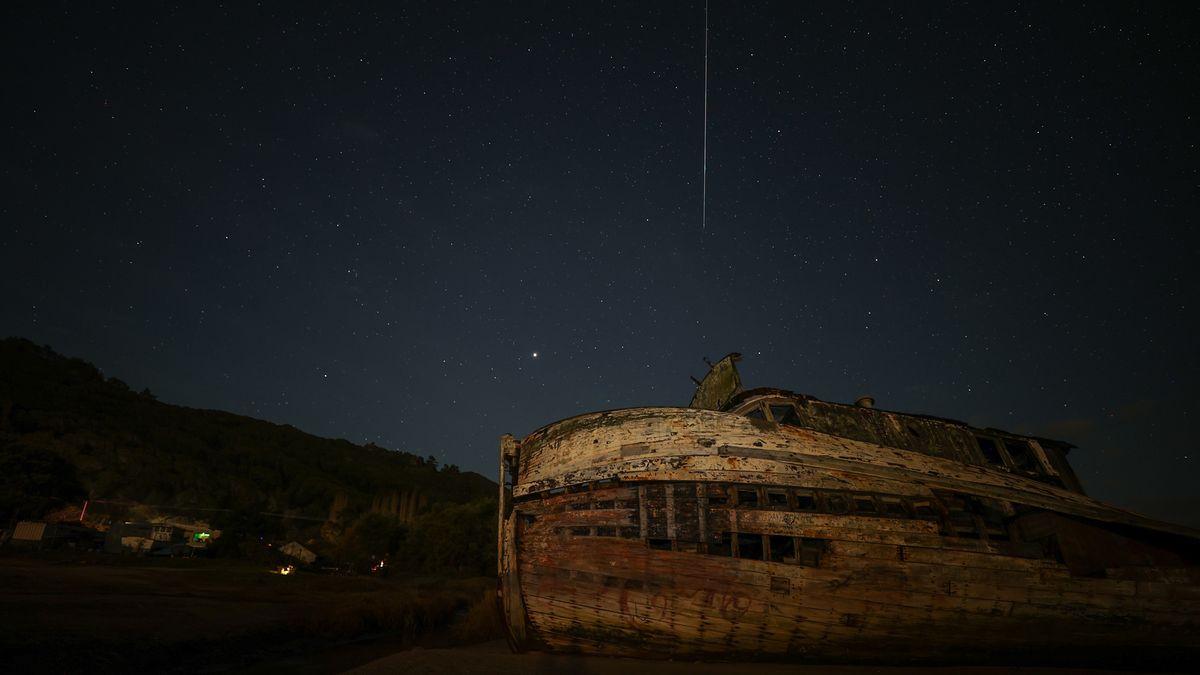
One of the most spectacular meteor showers of the year peaked tonight and avid skywatchers all over the world were able to capture the spectacle, although some complained that bad weather spoiled their views.
The Geminids are the second richest meteor shower of the year, surpassed only by the August Perseids. A product of debris from the unusual asteroid 3200 Phaethon, the Geminid meteor showers at their peak can produce up to 120 shooting stars per hour. When the sky is clear, skywatchers can catch up to two meteors per minute during the peak, which this year fell on the night of Dec. 13.
In California, photographer Tayfun Coskun caught some beautiful shooting star streaks above a shipwreck in Point Reyes, a fishing boat skeleton stranded on a sand bar near the small town of Inverness some 40 miles (64 kilometers) northwest of San Francisco. Other skywatchers took their shots against other spectacular backgrounds.
Related: Meteor showers 2022-23: Where, when and how to see them
Photographer Paula Corrette shared a mesmerizing snap on Twitter showing a star-studded sky featuring the big reddish spot of Mars and a meteor streak slicing through the photograph right next to it.
"A little condensation on the lens added a bit of shimmer to Mars as a meteor flew by," Corrette said in the tweet.
A little condensation on the lens added a bit of shimmer to Mars as a meteor flew by.#geminids #azwx pic.twitter.com/998n15Qw6qDecember 14, 2022
Another photographer, Frankie Lucena, shared a clip showing a bright streak of light crossing the dark sky near Porto Rico's Lajas Aerostat radar station.
"Geminid meteor near the Lajas Aerostat facing SE from Cabo Rojo, PR," Lucena tweeted.
Geminid meteor near the Lajas Aerostat facing SE from Cabo Rojo, PR. @adamonzon @DeborahTiempo @weatherchannel @amsmeteors #GeminidMeteorShower #Geminids @IMOmeteors @SPACEdotcom @NASA @eMeteorNews @meteordoc pic.twitter.com/uXsCdCpItEDecember 14, 2022
A Twitter user called WonderPixel shared footage from two web cameras showing a meteor brightening up the night in Maine. The user said this was the second catch in two consecutive nights.
"Wow, got another meteor on camera tonight here at https://ift.tt/wgOWM7f. Two days in a row! It's aiming for Harpswell, and two cams caught it," the user wrote.
Wow, got another meteor on camera tonight here at https://t.co/SldgGkDZRH. Two days in a row! It's aiming for Harpswell, and two cams caught it. #Geminids #Meteorshower #meteorspotted @SarahLongWMTW @colleenhurleywx @spann @StormHour @Met_CindyFitz @Todd_Gutner pic.twitter.com/U2M5qxj5vYDecember 14, 2022
Not everyone who was watching was taking images, but many still enjoyed the show.
Meteorologist Ed Piotrowski counted 15 meteors in only half an hour and despite less than perfect observing conditions.
"Despite the brightness of the waning gibbous moon and some cirrus clouds, I saw 15 meteors in roughly 30 minutes. Nothing terribly bright though," Piotrowski tweeted.
Many amateur radio operators were able to detect the signal of the space rocks' passing through Earth's atmosphere on their devices, according to ham radio enthusiast and podcaster Bryce Foster.
Related stories:
Some observers, however, were less lucky as clouds obstructed their view. A Detroit-based Twitter user called Delminico Primo said:
"Looks like Mother Nature is going to block my view of any #Geminids tonite. Was out for a few hours, and had a veiled look at just the brightest objects (Mars, Betelgeuse, and Capella in that first shot), but the clouds are having their way now."
The same was true for Jon Van Horne in Florida: "Y’all seen any #Geminids tonight from Space Coast, FL?! YA! neither me." Van Horne said in a tweet accompanied with a picture of a cloudy dusk sky.
The Geminids will continue through Dec. 17, but the frequency of the meteors will drop sharply. The next significant meteor shower will be the Ursids, which will peak around Dec. 22..
Follow Tereza Pultarova on Twitter @TerezaPultarova. Follow us on Twitter @Spacedotcom and on Facebook.
Article From & Read More ( The Geminid meteor shower of 2022 peaked tonight (photos) - Space.com )https://ift.tt/6xzeDTl
Science
No comments:
Post a Comment